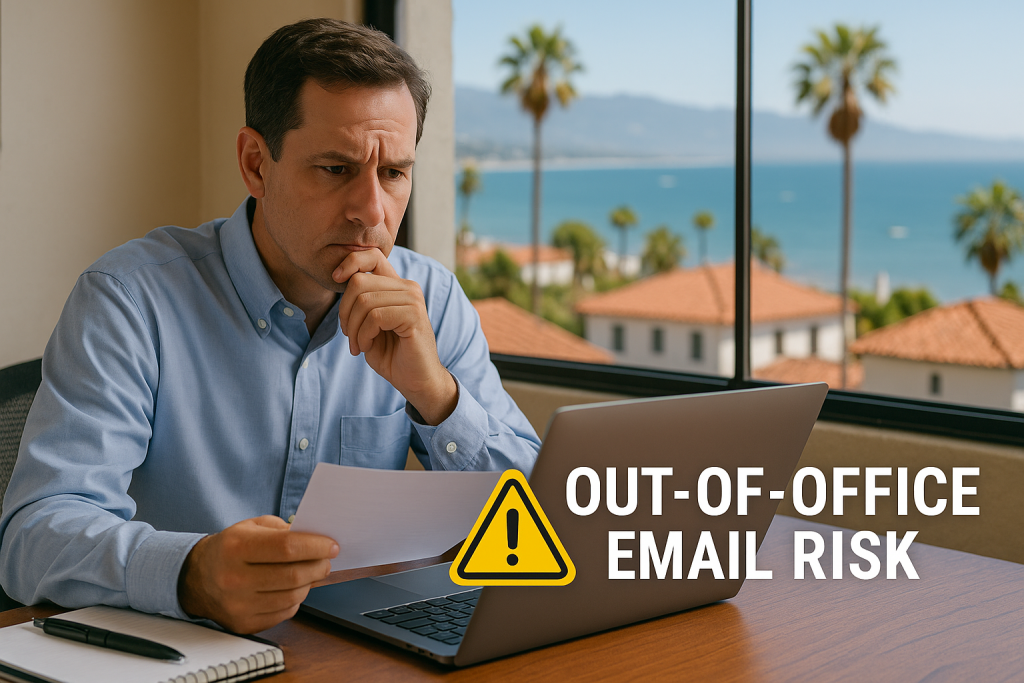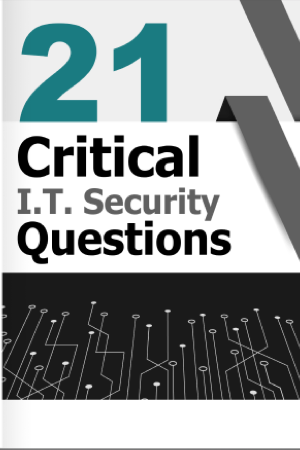
It’s vacation season—and you’ve earned a break.
But while you’re packing up for a few days away from the office, your email auto-reply might be sending a different kind of message:
“Hi! I’m out of the office until [date]. If it’s urgent, contact [Name] at [email address].”
Harmless, right?
Unfortunately, not always.
This kind of message is like a treasure map for cybercriminals—telling them exactly when you’re offline, who’s running the show in your absence, and how to exploit the moment.
Why Hackers Love Your Auto-Reply
Cybercriminals are getting smarter and more targeted. If they see you’re out, they know:
- You won’t be watching for suspicious emails
- They can impersonate you (or your backup) to trick someone else on your team
- Your staff might be more likely to act quickly without asking too many questions
It’s the perfect setup for a business email compromise—a well-crafted fake message asking for a wire transfer, login credentials, or sensitive info.
And if your firm handles confidential client data, financial reports, or health records? That quick email mistake could mean more than just lost money. It could mean lost trust—or worse, legal exposure.
What a Real Scam Looks Like
Here’s how it usually goes down:
- You set your out-of-office reply.
- A hacker grabs it and sends a fake email pretending to be you.
- The message goes to your coworker or assistant:
“Hey, can you send that invoice to the new account before 5 PM?” - Your team member wants to be helpful. They don’t pause to question it.
- By the time you return, thousands of dollars—or client data—are gone.
Scary? Yes. But preventable.
How to Keep Your Business Safe While You’re Out
You don’t have to stop using out-of-office replies. You just need to use them wisely—and have the right protections in place.
1. Keep Your Auto-Reply Vague
Don’t share your travel details or team hierarchy. Just keep it simple:
“I’m currently away from my desk. For immediate needs, please call our main office at [main phone number].”
No names. No job titles. No itinerary.
2. Train Your Staff to Pause Before Acting
Everyone on your team should know:
- Never act on an urgent request involving money or sensitive info without verifying it another way.
- Pick up the phone and confirm anything that feels out of the ordinary.
Even a quick “Just double-checking—did you really send this?” can prevent disaster.
3. Use Advanced Email Security
Phishing filters, impersonation protection, and domain monitoring can catch suspicious activity before it reaches your team’s inboxes.
4. Turn on Multifactor Authentication (MFA)
If someone does get a password, MFA keeps them out. No excuses—this should be on every business email account.
5. Partner With an IT Team That’s Watching Your Back
A good IT partner won’t just “set up your email.” They’ll proactively monitor for weird logins, spoof attempts, and security risks—even when you’re out sipping margaritas on the beach.
Want to Vacation Without Worrying About Your Inbox?
We help professional service firms in Santa Barbara lock down their systems, so cybercriminals stay out—no matter who’s in the office (or not).
🔒 Book a free security assessment today and we’ll show you how to:
- Tighten up your email settings
- Train your team to spot red flags
- Monitor for real-time threats
- And stop cyberattacks before they start
Because you should be thinking about sunscreen—not security breaches.



